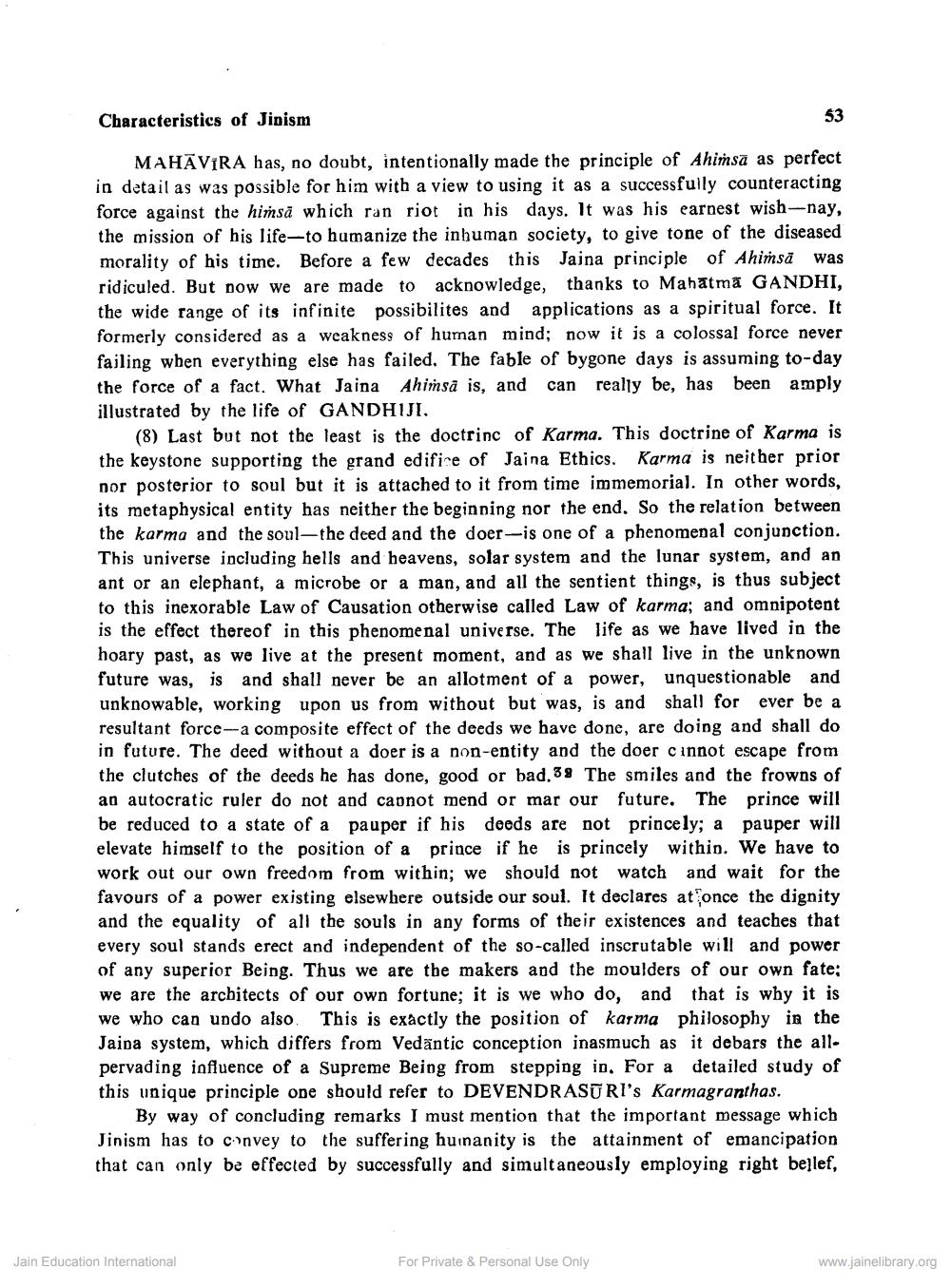________________
Characteristics of Jinism
MAHAVIRA has, no doubt, intentionally made the principle of Ahimsa as perfect in detail as was possible for him with a view to using it as a successfully counteracting force against the himsa which ran riot in his days. It was his earnest wish-nay, the mission of his life-to humanize the inhuman society, to give tone of the diseased morality of his time. Before a few decades this Jaina principle of Ahimsa was ridiculed. But now we are made to acknowledge, thanks to Mahatma GANDHI, the wide range of its infinite possibilites and applications as a spiritual force. It formerly considered as a weakness of human mind; now it is a colossal force never failing when everything else has failed. The fable of bygone days is assuming to-day the force of a fact. What Jaina Ahimsa is, and can really be, has been amply illustrated by the life of GANDHIJI.
53
(8) Last but not the least is the doctrine of Karma. This doctrine of Karma is the keystone supporting the grand edifice of Jaina Ethics. Karma is neither prior nor posterior to soul but it is attached to it from time immemorial. In other words, its metaphysical entity has neither the beginning nor the end. So the relation between the karma and the soul-the deed and the doer-is one of a phenomenal conjunction. This universe including hells and heavens, solar system and the lunar system, and an ant or an elephant, a microbe or a man, and all the sentient things, is thus subject to this inexorable Law of Causation otherwise called Law of karma, and omnipotent is the effect thereof in this phenomenal universe. The life as we have lived in the hoary past, as we live at the present moment, and as we shall live in the unknown future was, is and shall never be an allotment of a power, unknowable, working upon us from without but was, is and resultant force-a composite effect of the deeds we have done, are doing and shall do in future. The deed without a doer is a non-entity and the doer cinnot escape from the clutches of the deeds he has done, good or bad. 39 The smiles and the frowns of an autocratic ruler do not and cannot mend or mar our future. The prince will be reduced to a state of a pauper if his deeds are not princely; a pauper will elevate himself to the position of a prince if he is princely within. We have to work out our own freedom from within; we should not watch and wait for the favours of a power existing elsewhere outside our soul. It declares at once the dignity and the equality of all the souls in any forms of their existences and teaches that every soul stands erect and independent of the so-called inscrutable will and power of any superior Being. Thus we are the makers and the moulders of our own fate; we are the architects of our own fortune; it is we who do, and that is why it is we who can undo also. This is exactly the position of karma philosophy in the Jaina system, which differs from Vedantic conception inasmuch as it debars the allpervading influence of a Supreme Being from stepping in. For a detailed study of this unique principle one should refer to DEVENDRASURI's Karmagranthas.
By way of concluding remarks I must mention that the important message which Jinism has to convey to the suffering humanity is the attainment of emancipation that can only be effected by successfully and simultaneously employing right bellef,
Jain Education International
For Private & Personal Use Only
unquestionable and shall for
www.jainelibrary.org




